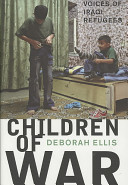
Provides interviews with twenty young Iraqi children who have moved away from their homeland and tells of their fears, challenges, and struggles to rebuild their lives in foreign lands as refugees of war.
- ISBN: 9780888999078
- Author: Ellis, Deborah
- Published: 2009 , Groundwood Books
- Themes: Difficult decisions, refugee, violence, War
- Descriptors: Iraq, Nonfiction, Young Adult (ages 14-18)
- No. of pages: 144

Children of War gives an almost unbelievable perspective coming from Iraqi refugee children. It is a perspective that you do not often see through the media or in books from the school library. What makes it so much more powerful is that it is history in the making. The stories that each child shares is moving and haunting. It is hard to imagine living a life full of experiences with death, bombing and hatred, but yet these children live it.
The collection of children’s voices, the nineteen hauntingly similar traumas, yet uniquely different stories is a brilliant nesting of experiences that defy the static, and sometimes disassociating nature of studying situations framed in the past. “This is happening right now, as we speak” currency that is a powerful personal address. Each story reads, as a personal letter, an introduction to the refugee and their family. The children’s stories continue to speak, long after the book is finished, as the reader continues to reflect, over dinner, or dishes, on whether Haythem is still playing toy cars with his dad, or whether Masim and her mother are still trapped by their political conditions and the abuse of her step-father. Between Deborah Ellis’s informative text and the children voices this is a tight construction, historically framing a complicated political region in a manageable way. The book can certainly stand alone, however its rich content leaves the reader with so many more questions. This book would provide an excellent text-set for , The Bite of the Mango, by Mariatu Kamara, in exploring and comparing the various ways art and dramatic performance help children manage their trauma.
This collection leaves echoes. Ending the book, feels incomplete, there are no “happily-ever-after” formulas that we expect in American literature, and pop-culture. Heart-moves will linger. Calls to actions will persist. The reader will leave and live with questionings. Questionings that aren’t wrapped up in a tidy package of happy endings, but the ones that encourage the replacement of an ethnocentric lens and look at; what it means to be human in a global humanity.
Deborah Ellis conducts interviews with young Iraqis up to age 19. These straightforward testimonials of the bombing, invasion, and refugee crisis are told through the eyes of the children. The book gives their reflections on this experience and lets us know that their lives are forever changed by the experiences. Most are refugees in neighboring Jordan and Syria, but a few are now living in Canada.
The firsthand accounts are horrifying and moving. Many have watched multiple family members die. Most have lost everything they had in Iraq, and are very fearful of returning, but miss their homeland, family, friends, etc.
This book tells the other side of the story with regards to the U.S. led invasion. These children, once again, are the victims. This book is critical in terms of giving child war victims a voice that needs to be heard. The war has taken a back seat here in the U.S. We are now grappling with other issues related to the invasion, i.e. recession, the Bush legacy, etc. But these children and families may never have normal lives again, or know the lives that they once had in Iraq. Many of them had stable, prosperous childhoods in their homeland. Now, they may never see Iraq again.
A complimentary copy of this book would make a great addition to the White House library. Could someone mail it to Obama?